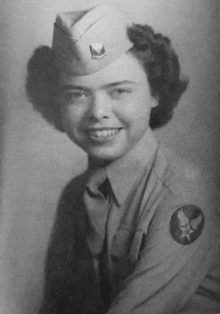Johnnie Phelps

Nell "Johnnie" Phelps (April 4, 1922 - December 30, 1997) was a lesbian member of the Women's Army Corps who managed to convince General Dwight D. Eisenhower not to eject lesbian members of the WAC as he had planned.
Early life
Johnnie Phelps was born in North Carolina[1] as Nell Louise Phelps on April 4, 1922, and was raised with an adoptive family.[2][3]
Military Career
Johnnie Phelps joined the first Women's Army Corps battalion during World War II and she arrived to the rank of Sergeant.[4] She first served in the South Pacific working as a medic and later she reenlisted and was sent to Germany as part of the Post-WWII Occupation forces Eisenhower. Wounded in action in Philippines, she received the Purple Heart and was honorably discharged in 1945.[5][6][1][3]
She re-enlisted in 1946 and was assigned to head the motor pool for General Eisenhower.[1][3] As reported in an interview with BunnyMacCulloch in 1982,[4] in 1947 she was told by General Eisenhower, "It's come to my attention that there are lesbians in the WACs, we need to ferret them out...." Phelps replied, "If the General pleases, sir, I'll be happy to do that, but the first name on the list will be mine." Eisenhower's secretary added, "If the General pleases, sir, my name will be first and hers will be second." Phelps then told Eisenhower, "Sir, you're right, there are lesbians in the WACs – and if you want to replace all the file clerks, section commanders, drivers, every woman in the WAC detachment, I will be happy to make that list. But you must know, sir, that they are the most decorated group – there have been no illegal pregnancies, no AWOLs, no charges of misconduct." Eisenhower dropped the idea.[7][5][2][6][1][8][9] Later Phelps said "There were almost nine hundred women in the battalion. I could honestly say that 95 percent of them were lesbians".[2] She was honorably discharged a second time.[3]
Later Career
Johnnie Phelps left the army to establish her own printing business, which she ran for years.[3][1]
Phelps joined the National Organization for Women and founded the San Gabriel Valley - Whittier chapter in 1979. She chaired the California Lesbian Task Force (a branch of California NOW), and spearheaded protests on behalf of the Norton Sound Eight - eight female crew members aboard the USS Norton Sound who were charged with "homosexual misconduct." In addition, she joined the Southern California Women for Understanding organization and served on the Los Angeles County Veterans' Advisory Commission. A recovering alcoholic, she also served as president of the Alcoholism Center for Women.[1][3]
She was appointed by Gloria Molina to the Los Angeles Commission on Veterans' Affairs and resigned in 1996 due to severe health problems.
She appeared in the Before Stonewall documentary and she was interviewed for books like My Country, My Right to Serve by Mary Ann Humphrey,[10] and Conduct Unbecoming by Randy Shilts.[2]
She appeared in the Trailblazers: Unsung Military Heroines of WWII documentary by Mindy Pomper, shown ad infinitum at the Women's Memorial in Washington D.C.
Personal life
Phelps married a Navy man, but the marriage was unhappy and to escape it she joined the military in 1943.[3]
Johnnie Phelps' first female lover died when their boat was bombed as they landed on Leyte, Philippines, in 1944.[6]
Living in Southern California, Phelps became politically active in the 1970s. It was around this time that she met her last partner, Grace Bukowski, who survived her.[3] Phelps died on December 30, 1997, at the Veterans Home in Barstow, and her ashes were buried with full honor in the U.S. Veterans Cemetery in Westwood, Los Angeles.[6][3]
Legacy
In 1993 Veterans for Human Rights organized the annual "Sgt. Johnnie Phelps Annual Awards Banquet" in Portland, Oregon.[2]
References
- 1 2 3 4 5 6 Sears, James Thomas (2001). Rebels, Rubyfruit, and Rhinestones: Queering Space in the Stonewall South. Rutgers University Press. p. 342. Retrieved 30 December 2017.
- 1 2 3 4 5 Hampf, Michaela (2010). Release a Man for Combat: The Women's Army Corps During World War II. Böhlau Verlag Köln Weimar. p. 240. Retrieved 30 December 2017.
- 1 2 3 4 5 6 7 8 9 "Finding aid of the Johnnie Phelps Papers and Memorabilia" (PDF). ONE National Gay and Lesbian Archives. Retrieved 30 December 2017.
- 1 2 Faderman, Lillian (2012). Odd Girls and Twilight Lovers: A History of Lesbian Life in Twentieth-Century America. Columbia University Press. p. 118. Retrieved 30 December 2017.
- 1 2 Shilts, Randy (2014). Conduct Unbecoming: Gays & Lesbians in the U.S. Military. Open Road Media. Retrieved 30 December 2017.
- 1 2 3 4 Stewart, Chuck (2014). Proud Heritage: People, Issues, and Documents of the LGBT Experience [3 volumes]: People, Issues, and Documents of the LGBT Experience. ABC-CLIO. p. 392. Retrieved 30 December 2017.
- ↑ Marcia M. Gallo (2006). Different Daughters: A History of the Daughters of Bilitis and the Rise of the Lesbian Rights Movement. Carroll & Graf Publishers. pp. 67–. ISBN 978-1-58005-252-8.
- ↑ Kuhn, Betsy (2011). Gay Power!: The Stonewall Riots and the Gay Rights Movement, 1969. Twenty-First Century Books. p. 28. Retrieved 30 December 2017.
- ↑ Kaiser, Charles (2007). The Gay Metropolis: The Landmark History of Gay Life in America. Grove/Atlantic, Inc. p. 56. Retrieved 30 December 2017.
- ↑ Humphrey, Mary Ann (1990). My Country, My Right to Serve: Experiences of Gay Men and Women in the Military, World War II to the Present. HarperPerennial. Retrieved 30 December 2017.